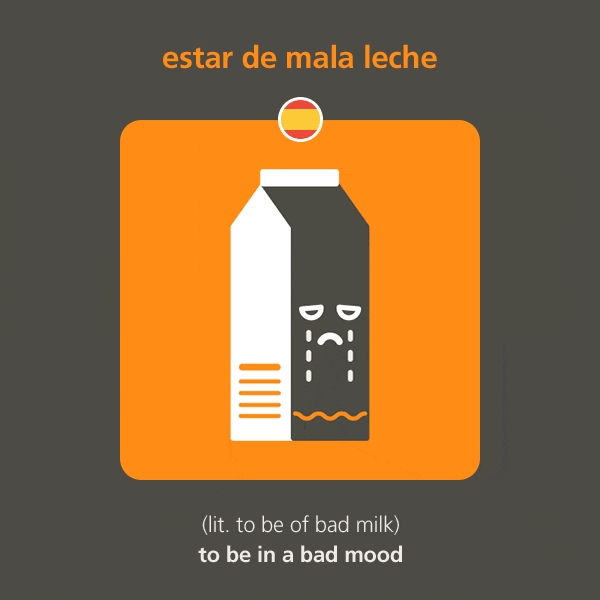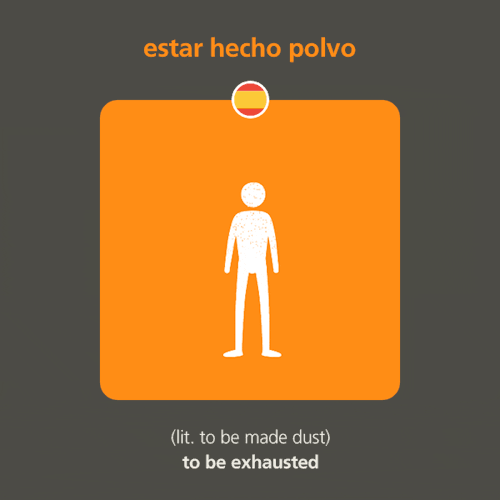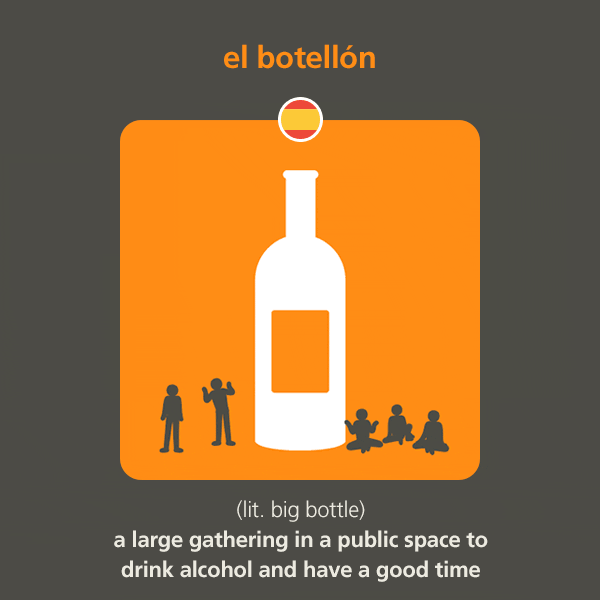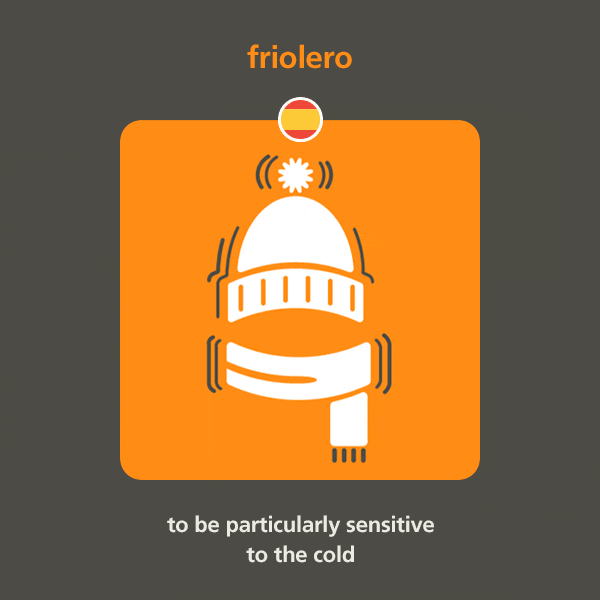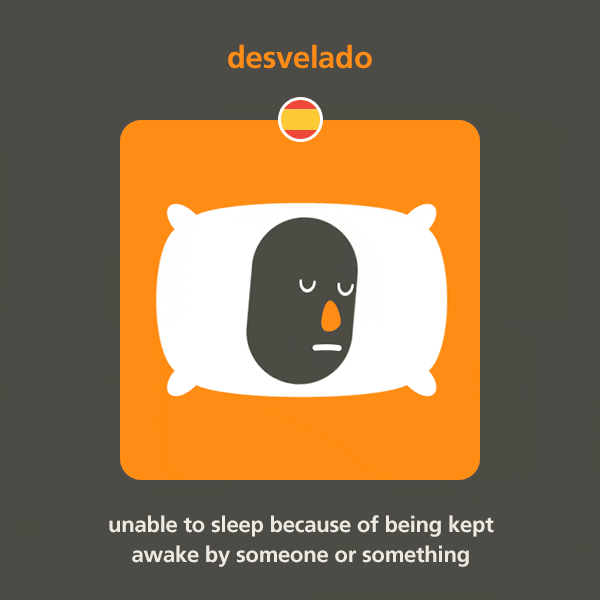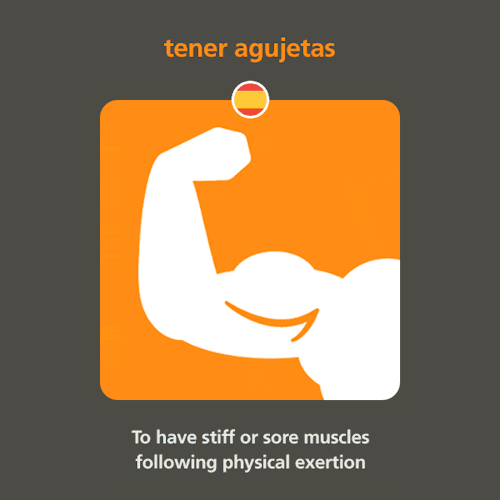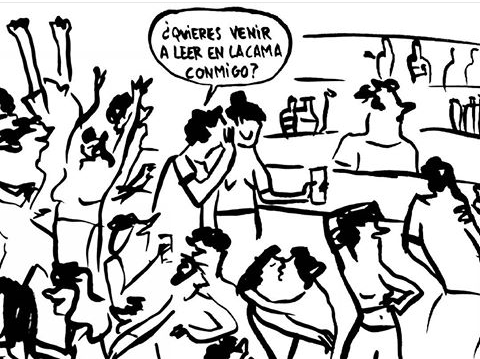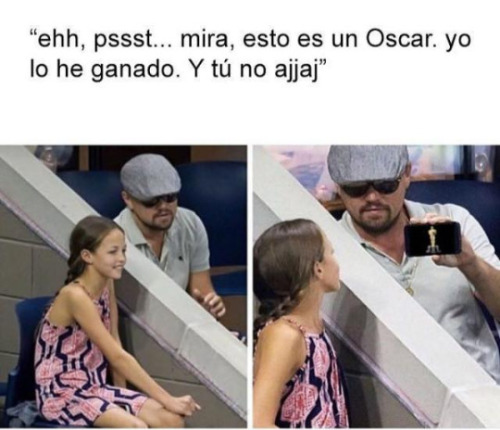#learning spanish
Also in poetic or lyrical Spanish you may also find that verbs go at the very end of sentences. Partially because it’s dramatic, partially for rhyming.
So like consider No se habla de Bruno:
Bruno con voz misteriosa habló = Bruno with a mysterious voice spoke
In your regular Spanish you’d say Bruno habló con voz misteriosa “Bruno spoke with a mysterious voice”
The example saying habló at the very end pulls focus to the very end of the sentence and it’s dramatic
Another example of some changeable syntax is Isabela’s line:
Él vio en mí un destino gentil - una vida de ensueños vendrá. Y que así el poder de mi don como uvas va a madurar
“He saw within me a pleasant fate - a life of my dreams will come. And as such the power of my gift like grapes will ripen”
You see basic syntax in vio en mí rather than en mí vio which is also possible
Then you see una vida vendrá while more basic would be vendrá una vida
And, then again el poder de mi don va a madurar which could be phrased as va a madurar el poder de mi don
So it’s really a matter of where you want your emphasis and how emphatic you’d like to be
I will say that Spanish does sometimes like phrase something as SOV [subject object verb] and leave the verb all the way at the very end for things like poetry… partially for emphasis on the verb, partially because it’s easier to rhyme verbs in Spanish
SOV (and OSV potentially) in Spanish is also a kind of… suspension effect. You say your whole line and finish with a verb, so you’re sort of waiting to see what will happen. Isabela’s second line reads very much like that. It has a theatrical quality designed to capture attention and sort of keep you waiting
These kinds of constructions make more sense in context and many times carry over the sentiment into other languages; they’re things people do naturally
One of the parts of accent rules / esdrújula that gets glossed over sometimes is the use of monosyllabic words
Multisyllabic words have different rules about where the tonic stress [the part you accentuate when you speak], but by definition monosyllabic words only have one syllable and so that’s always where the tonic stress is
That becomes more important when you have compound words
So for example, think dos “two”,tres “three”, and seis “six”
They all are monosyllabic so that tonic stress couldn’t be anywhere else
Then you have words like veintidós “22″, or veintitrés “23″, or dieciséis “16″ and suddenly there are more syllables
BUT - here’s the thing. That stress is still there… there are just more syllables now. That’s why there’s an accent mark on the last syllable (along with some other more complicated rules)
-
The same issue exists with un “one/a” with masculine nouns and then its derivatives for countable nouns:
un / una = one / a
algún / alguna = some
ningún / ninguna = none, not a single oneun año = a year
algún año = some year
ningún año = no year, not a single yearTiene un año. = He/She is one year old.
Tiene veintiún años. = He/She is 21 years old.
Tiene treinta y un años. = He/She is 31 years old.
Tiene cuarenta y un años. = He/She is 41 years old.
Tiene cincuenta y un años. = He/She is 51 years oldciento un dálmatas = 101 Dalmatians
*Note: For tener X años which is “to be X years old” it’s technically a “countable noun” expression… you have X amount of years, that’s why you’re seeing un rather than uno “one”; the number 11 is ommitted from my list because the word for “eleven” is once and so the un/una rules don’t apply to it
Whenun becomes are one single word like veintiún for countable nouns it takes the accent mark… when they’re separate like treinta y un there’s no need for the accent mark because un goes back to being monosyllabic
NOTE: Also because you’re seeing un you have to keep in mind that countable nouns are technically gendered
un día = a day
un mes = a month
una semana = a week
una hora = an hourveintiún días = 21 days
veintiún meses = 21 months
veintiuna semanas = 21 weeks
veintiuna horas = 21 hoursun hombre = a/one man
algún hombre = some man
ningún hombre = no man
veintiún hombres = 21 men
ciento un hombres = 101 menuna mujer = a/one woman
alguna mujer = some woman
ninguna mujer = no woman
veintiuna mujeres = 21 women
ciento una mujeres = 101 women
For additional info: Please check out this link
I find that countable nouns really kick my butt when it comes to currency the most because whether it’s dollars or euros or pesos or pesetas it’s all technically gendered
-
As far as accents: These rules are pretty standardized in Spanish. They’re there to make sure a reader knows where to put their vocal emphasis for multisyllabic words. Native speakers may omit these accent marks sometimes because they (generally) already know what syllables are stressed or unstressed
Sometimes, you want to say more than just, “Que bueno”, or “Que terrible”. These are different ways that you can respond to someone, and sound more fluent!
Claro | Sure, Of course, Naturally
Para Nada | No way, No
En Absoluto | Absolutely Not
It looks positive, because there isn’t a “no”, but it’s negative.
Imagínese(Imagínete) | Imagine that!
For times when saying “Holy crap!” would be inappropriate. Imagínese is formal, Imagínate is informal.
En tus sueños | In your dreams
Another way to say “no”.
¿Verdad? | Really?, Is that so?
¿En serio? | Seriously?

Tokyo/La casa de papel
This drawing took so long but it was worth it!
I should do my homework, I said while clicking on the next episode.
adjective
1. burning, scalding
2.(of a colour)blazing
3. passionate, fervent, or ardent.
Su pasión ardiente se extinguió por el viento del norte.
Their burning passion was extinguished by the north wind.
There is NO hard language, just different ones. Even the hardest language is just average difficult.

As many of you know there are 5 groups of languages for English native speakers based on “how hard” a language is.
With group one being the easiest (languages like Spanish, French, Italian, etc.) to group five including the hardest (like Chinese, Japanese, Korean, etc.).
But to which group a language belongs can change drastically based on which languages you speak or are interested in.
So let’s take a look at “how hard a language is” when you actually don’t know a single language at all.
When learning their mother tongue, it’s all the same, all around the world. Kids can express themselves in an easy way at the age of 4 to 5. At this point they can tell you stories about what happened during the day, follow commands that include multiple steps (like go brush your teeth, then change clothes, go to bed, etc.) and also strangers should be able to understand what the kid is saying. So the kid is at a level what we would consider fluent but not at a high native speaker level, because it can’t understand complex topics. A kid is starting to actually try talking when it’s around 6 months old.
So as a result we can say if you don’t know any language at all you need around 4 years to learn it in a way, to be conversational. And you have to keep in mind that for the first language kids have the URGE to learn it, because otherwise they don’t “belong” to the group and humans are social animals. They can’t just switch to their native language if they don’t want to learn anymore. If they want to talk to ANY person, they HAVE TO learn their first language. It’s socially necessary and back in time an important step of survival.
So let’s say if you don’t know any other language and have a very important reason for learning one AND are surrounded by it non stop with people trying to talk to you ALL THE TIME, you will need 4 years to be on a decent conversational level.
So if we take a look at the 5 groups of languages, even the hardest ones don’t take adults THAT long.
And adults have the opportunity to have social contact without their target language.
Even if you don’t “need” your target language, people of this language aren’t trying to talk to you all the time and you’re not surrounded by it non stop, adults are able to reach an even higher level as “conversational” in this time span.
So it’s not like the “hardest” group of these language rankings is actually hard, it’s just closer to “learning from scratch” because it’s not closely related to the language you know. And even then you’re still faster than having to learn a language totally from point zero because you already learned how a language in general works.
The result is, the hardest group is more like the normal group and everything else is just “how much faster and easier will it be based on what I already know”.
So don’t scare yourself with stuff like “oh my god, everyone says it’s such a hard language… can I even learn it?”. Yes, you can. You will even learn it faster than native speakers without having the language surrounding you 24/7. If 4 years olds can learn it, every adult can learn it. And it’s NOT(!) a hard language! It’s just harder than the other ones and ONLY(!) because you already have a great advantage when it comes to the other languages. But the level of difficulty, even for the hardest language is actually just “normal”.
And it’s annoying that people keep talking about such called “hard languages”. Theres just an average difficulty and everything else are just extra points you gained through your native language that makes specific languages EASIER for you.
Let’s look at it like that:
With every language you start at 0% (what every kid no matter which language they’ll learn as their native language does).
The closer your target language is to the languages you know, the higher your start percentage is.
For example if you’re Korean learning Japanese, the grammar is quite similar so you already start with 20%.
If you’re Spanish and learn Italian you even have many words in common, so you start with 30%.
(Btw the percentage numbers are just random numbers to show what I mean, they are not fact numbers.)
If you’re Russian you’ll start with 10% when learning German because you already know how cases work.
And so on. It works with EVERY language. If you know genders, cases, conjugation, etc. and your target language includes that, you don’t have to figure out how it works, you already know it. Sure you often have to learn new words for that but it’s not like you have to figure out the system behind that.
So the absolute WORST case could only be to start at 0% (what you probably never will because in the very basic every language is the same, for example trying to talk about a subject, etc. You already know the purpose of a language.) BUT you will NEVER(!) start with minus percent. So stop freaking yourself out. There is no hard language, just a more different system you have to get used to.
It’s not hard if everyone, literally everyone, can learn it. Especially millions of 4 years olds. Don’t give up just because you make mistakes or don’t get the hang of something right away.
Every kid needs around 4 years to speak the absolute same stuff, no matter which language (not including writing system in later years). So all languages have the absolute SAME difficulty when it comes to learning them. It just depends on what you already know, which can make it easier/faster.

Hello ladies and gentlemen, I hope you all are having a wonderful day. :)
Lately I’m thinking about learning two languages at the same time. Usually I always was like “hell no, this is not going to happen” because I remember when I first tried doing this (without a plan or any knowledge how I could do that) I failed. Like really hard. I always switched up words and grammar, because I was learning them literally AT THE SAME TIME. For example when I tried to learn a new word, I learned it for language A and B simultaneously. Later I didn’t know which word belonged to which language. Or if I knew it in language A I just couldn’t get away from this word. No chance to remember it in language B.
___________________________
So the goal is to separate them as much as you can! You want to learn them at the same time but NOT together. Make them as different as possible.. You want your brain to connect these languages with different things. Now, it’s time to take a look on how you can do that.
- Don’t start them at the same time. I know first it sounds strange if you want to learn two languages at the same time but you shouldn’t start both on the same day. Because right at the beginning you have to learn the same words like “hello, how are you, my name is, bye, etc.” and as I said you want to separate them as much as you can. Just pick one and concentrate on it for a few weeks (like one month or if you learn fast even less) and then start the other one. This way you already know the very basic stuff in language A and don’t confuse it with language B.
- Don’t take similar languages. The worse you can do is learning two similar languages. First it sounds like a good idea, because of similar grammar and especially similar words, which could make you think “this way I learn faster” but it’s NOT the case.
Italian and Spanish? Bad idea.
German and Dutch? Bad idea.
Russian and Ukrainian? Bad idea.
The best is to take languages that aren’t even in the same language family. - Take languages with different letters. This is a hack that can help you a lot. Especially if you are a visual learner, languages with different writing systems will make it nearly impossible to switch them up. I mostly learn stuff through seeing it. Like seriously, I can’t remember shit if I just hear it but I were able to learn 500 Spanish words for a test on the next day in 2 hours because I used a technique for visual learners. Of course I wasn’t able to keep all of them in the long term memory but it was enough to get an A. And I never ever switched up words (even if I learned them at the same day in two languages) if they were written in different letters, because if I remember a word, I see it in front of my inner eye. So to all visual learners: THIS is the best thing you can do.
- Use different colours and stick to them. For example always use blue for Russian and red for Spanish. It makes it easier for your brain to switch between them. You brain will associate the language with this colour. So if you switch from Russian to Spanish and your brain sees red it will automatically first use the connections it built up around this colour. And you connected Spanish with red. I don’t know how to explain that properly but if you see red your brain connects it with Spanish vocab because it’s “closer” than the Russian vocab.
- Use different times. Same as above. You connect one language with a specific time. For example after you get up in the morning you study Russian and before you go to bed you study Spanish.
- One of the languages should be a familiar one. This way you will have “less” work. For example if your native language is French then Spanish or Italian are good ones for you. But remember that the second language you chose should be as different as possible.
- Chose a main language. There will be a time when you question yourself, if this was a good idea. It will feel like you’re getting nowhere and of course you will think about if it’s because you don’t concentrate on one language. With a main language you will see more progress because you spend more time with it. A really great way to motivate yourself and if you don’t like the choice you made you can always take the other one as main language.
- Make a plan. I don’t know what else I could say about this because you probably all know what I mean. You have to make a plan WHEN you learn WHICH language for HOW LONG and WHAT you want to learn.
- Think in your target languages. As soon as you have an intermediate level, you can start using both languages at the same time and even practice them together. Try to translate from language A to language B. This way you can learn to think in your new languages because there is no need to think in your native language at all. At this point try to avoid your native language as much as you can.
- Take your time. You can’t expect to learn two languages as fast as you would learn a single one.
- Learn at different places. Same as the colour and time tip. Connect every language with another place. For example Russian is the living room and Spanish the kitchen. Or if it’s possible try to learn one of them at the library/park/etc.
- Connect them with emotions (and not only textbooks). For example speaking Spanish with your friends (happy, comfortable, etc.) and exploring Moscow while speaking Russian with the natives there (exited, nervous, etc.)
- Study both every day. I guess I don’t need to say more.
- Keep in mind that it’s even harder to keep your motivation. If you loose motivation in learning languages, it will be twice as hard to get back on track. Because everything will take twice as long. So if you find it hard to learn one language if you’re not motivated, you should consider learning one after another. Your progress will be slower if you learn two languages at once and if you’re not a person who can handle this, you should stick with one.
- Make everything different. I know I mentioned it a lot but just think about what you could change in your learning routine. You can help your brain to connect many things with language A or language B. You drink Cola while studying language A and tea while studying language B. Put a picture of Spain on your table while studying Spanish and one of Russia while studying Russian. Write with a black pencil in Spanish and with a grey one in Russian. Meditate before Spanish and work out before Russian (or other morning/night routines you do, followed by the language you want to connect it with).
I hope this post was helpful for you and keep in mind that if you just want to speak as many languages as possible, one after another will be faster. But if you want to learn both languages at the same time because you really like them, there is nothing stopping you. :)
I am now getting advertisements in both English and Spanish. I feel like this is some sort of milestone in learning languages that I have reached


Most Common Adjectives in Spanish PS: Learn Spanish with the best FREE online resources, just click here:https://www.spanishpod101.com/?src=tumblr_adjectives-10_image_053122

1️⃣Choose 1 Verb in Spanish. 2️⃣Use it in a sentence. 3️⃣Comment your sentence below! P.S. Learn Spanish with the best FREE online resources, just click herehttps://www.spanishpod101.com/?src=tumblr_verbs-13_image_052622

Sentence Components in Spanish ⚙️ PS: Learn Spanish with the best FREE online resources, just click here https://www.spanishpod101.com/?src=tumblr_sentence-component_image_052422

Negative Sentences in Spanish! PS: Learn Spanish with the best FREE online resources, just click here https://www.spanishpod101.com/?src=tumblr_negative-sentence_image_052022

Verb Pairs in Spanish PS: Learn Spanish with the best FREE online resources, just click here https://www.spanishpod101.com/?src=tumblr_verb-pairs_image_051722

Do you know how to write your #Resume in #Spanish? PS: Learn Spanish with the best FREE online resources, just click here https://www.spanishpod101.com/?src=tumblr_resume_image_051222
Sé cómo luces, pero no sé cómo se siente girar cada mañana para verte soñando y sentir tu pulso. Sé dónde vives, pero no cómo se siente entrelazar tu mano con la mía correr por las calles bajo una noche estrellada. Sé cómo suena tu voz, pero no cómo se siente yacer a tu lado mientras la lluvia cae sobre el techo y me rodeas con tu brazo para protegerme de la oscuridad. Sólo quiero estar contigo.Ich weiß, wie du aussiehst, aber nicht, wie es sich anfühlt, mich morgens früh umzudrehen, dich träumen zu sehen, und deinen Herzschlag zu spüren.
Ich weiß, wo du wohnst, aber nicht, wie es sich anfühlt, deine Hand in meiner zu halten, und nachts unter den Sternen durch die Straßen zu gehen.
Ich weiß, wie sich deine Stimme anhört, aber nicht, wie es sich anfühlt, neben dir zu liegen, während Regentropfen aufs Dach fallen, und du mich im Arm hältst, um mich vor der Dunkelheit zu schützen.
Ich will einfach nur bei dir sein.I know what you look like, but not how it feels to roll over early in the morning to see you dreaming, and feel your heartbeat.
I know where you live, but not how it feels to hold your hand in mine, and run through the streets at night under the stars.
I know what your voice sounds like, but not how it feels to lie next to you while raindrops fall on the roof, and you hold me in your arm to protect me from the darkness.
I just want to be with you.Conosco il tuo aspetto, ma non cosa si sente nel girarsi al mattino e vederti sognare e sentire il battito del tuo cuore.
So dove vivi, ma non cosa si sente nel tenere la tua mano nella mia, e correre per strada in una notte stellata.
Conosco il suono della tua voce, ma non cosa si prova a stare sdraiata accanto a te mentre sul tetto cade la pioggia e tu mi tieni fra le braccia per proteggermi dall’oscurità.
Voglio solo stare con te.Conheço sua aparência, mas não a sensação de rolar para o seu lado de manhã cedo e te ver sonhando, e sentir os batimentos do seu coração.
Eu sei onde você mora, mas não como é segurar sua mão e correr pelas ruas de noite banhados pela luz das estrelas.
Eu conheço o som da sua voz, mas não como é deitar ao seu lado enquanto as gotas de chuva caem sobre o teto, e você me segurar em seus braços e me proteger da escuridão.
Só quero estar com você.A ken whit ye look like, but no how it feels tae roll o’er early in the morn tae see ye dreamin an’ feel yer heartbeat.
A ken whar ye bide, but no how it feels tae haud yer hand in mine, an clatter through the streets on a starlicht nicht.
A ken whit yer voice sounds like, but no how it feels tae lie next tae ye wi the rain stoatin aff the roof an we courie in tae protect me fae the dark.
A jist want tae be wae ye.Ik weet hoe je eruit ziet, maar niet hoe het voelt, me ‘sochtends vroeg om te draaien, jou naast me te zien dromen en je hart te voelen kloppen.
Ik weet waar je woont, maar niet hoe het voelt, jouw hand in de mijne te houden en ‘snachts door de straten te rennen onder de sterren door.
Ik weet hoe je stem klinkt, maar niet hoe het voelt, naast je te liggen
terwijl regendruppels op het dak vallen en jij me vasthoudt in je armen om me te beschermen voor de duisternis.
Ik wil gewoon bij jou zijn.Nasıl göründüğünü biliyorum, ama sabah yanında uyanmanın, rüya gördüğünü görmenin ve kalp atışını duymanın nasıl bir his olduğunu bilmiyorum.
Nerede yaşadığını biliyorum, ama ellerini tutmanın, ve gece yıldızların altında sokaklarda koşmanın nasıl bir his olduğunu bilmiyorum.
Sesinin nasıl olduğunu biliyorum, ama yağmur damlaları çatıya düşerken senin yanında uzanmanın ve senin beni karanlıktan korumak için kollarına almanın nasıl bir his olduğunu bilmiyorum.
Sadece seninle olmak istiyorum.Știu cum arăți, dar nu știu cum se simte să mă răsucesc în pat dimineața devreme ca să te văd cum visezi și ca să îți simt bătaia inimii.
Știu unde locuiești, dar nu cum se simte să îți țin mâna-ntr-a mea și să alergăm pe străzi noaptea sub stele. Știu cum sună vocea ta, dar nu cum se simte să stau întins lângă tine în timp ce picăturile de ploaie cad pe acoperiș și tu mă ții în brațe ca să mă protejezi de întuneric Vreau doar să fiu cu tine.Ik weet, woans du uutsüüst, man nich, woans sik dat anföölt, mi morrns frö ümtodreien, di drömen to seen, un dien Hartslag to spören.
Ik weet, ‘neem du waanst, man nich, woans sik dat anföölt, dien Hand in mien to holen, un nachts ünner de Steerns döör de Straten to gaan.
Ik weet, woans sik dien Stimm anhöört, man nich, woans sik dat anföölt, blangen di to liggen, wielst Regendrüppels op’t Dack fallt, un du mi in’n Arm höllst, üm mi vöör de Düsterheid to schulen.
Ik will eenfach bloot bi di ween.Jag vet hur du ser ut, men inte hur det känns att vända sig om tidigt på morgonen, för att se dig drömma, och känna dina hjärtslag.
Jag vet vart du bor, men inte hur det känns att hålla dina hand i min, och springa över gatorna på natten under stjärnorna.
Jag vet hur din röst låter, men inte hur det känns att ligga bredvid dig medan regndropparna faller på taket, och du håller mig i dina armar för att skydda mig från mörkret.
Jag vill bara vara med dig.I waß wie du ausschaust, owa ned, wie sa sie aufüht, mi in da frua umzudrahn, di trama z’seng, und dein Herzschlog z’gspian.
I waß, wo du wohnst, owa ned, wie sa sie aufüht, dei Haund in meina z’hoitn, und nochts unta die Stern duach d’Straßn z’gei.
I waß, wie sie dei Stimm auheat, owa ned, wie sa sie aufüht, nem dia zu liegn, daweu Regntropfn aufs Doch foin, und du mi in Oam hoitst, um mi va da Dunklheit zu schützn.
I wü afoch nua ba dia sei.Ich weiss, wie du usgsehsch, aber ned, wies sich afühlt, mich am Morge früeh umzdreihe, dich träume z’gseh und din Herzschlag z’gspüre.
Ich weiss, wo du wohnsch, aber ned, wies sich afühlt, dini Hand i minere z’hebe und die Nacht under de Sterne dur d’Strosse z’laufe.
Ich weiss, wie dini Stimm tönt, aber ned, wies sich afühlt, näbe der z’legge, während Rägetropfe uffs Dach gheied und du mich im Arm hebsch, um mich vor de Dunkelheit z’schütze.
Ich wett eifach nur be der si.Naf kif tidher, imma mhux kif tinħass meta ndur kmieni filgħodu biex narak toħlom u nħoss qalbek tħabbat.
Naf fejn tgħix, imma mhux kif tinħass meta nżomm idejk f'tiegħi u niġru fit-toroq billejl taħt l-istilel.
Naf kif leħnek jinstema, imma mhux kif tinħass meta nimtedd ħdejk waqt li l-qtar tax-xita jinżlu fuq is-saqaf, u żżomni f'idejk biex tiproteġini mid-dlam.
Jien irrid inkun miegħek biss.Ég veit hvernig þú lítur út, en ekki hvernig það er að velta mér á hina hliðina snemma morguns og sjá þig dreymandi, og finna hjartslátt þinn.
Ég veit hvar þú býrð, en ekki hvernig það er að hafa hönd þína í lófa mínum og hlaupa um strætin um nótt, undir stjörnunum.
Ég veit hvernig rödd þín hljómar, en ekki hvernig það er að liggja hjá þér á meðan regndropar falla á þakið og þú heldur mér í fangi þér til þess að vernda mig frá myrkrinu.
Mig langar bara að vera hjá þér.Alam ko kung ano’ng itsura mo, pero hindi ko alam kung ano’ng pakiramdam ng magpagulong sa higaan sa umaga para makita kang nananaginip, at maramdaman ang tibok ng puso mo.
Alam ko kung saan ka nakatira, pero hindi ko alam kung ano’ng pakiramdam ng mahawakan ang kamay mo, at makipagtakbuhan sa kalye sa gabi, sa ilalim ng mga bituin.
Alam ko ang boses mo, pero hindi ko alam kung ano’ng pakiramdam ng mahiga sa tabi mo habang pumapatak sa bubong ang ulan, at ibinabalot mo ako sa iyong mga bisig para protektahan ako mula sa dilim.
Gusto lang kitang makasama.저는 당신이 어떻게 생겼는지 알지만, 이른 아침에 돌아누워 당신이 꿈을 꾸고 있는 것을 보고, 당신의 심장박동을 느끼는 것이 어떤 것인지는 모릅니다.
저는 당신이 어디에 사는지 알지만, 당신의 손을 제 손으로 잡고, 밤에 별 아래의 거리를 달리는 것이 어떤 것인지는 모릅니다.
저는 당신의 목소리가 어떻게 들리는지 알지만, 빗방울이 천장에 떨어질 때 당신 옆에 눕고, 당신이 저를 팔로 안아 어둠으로부터 지켜주는 것이 어떤 것인지는 모릅니다.
저는 그저 당신과 있고싶습니다.Je connais ton apparence, mais pas le sentiment de me retourner le matin pour te voir rêver, et pour sentir tes battements de coeur.
Je connais ton adresse, mais pas le sentiment de tenir ta main dans la mienne, et courir par les rues la nuit sous les étoiles.
Je connais ta voix, mais pas le sentiment de m’allonger à côté de toi, pendant que les gouttes de pluie tombent sur le toit, et que tu me tiens pour me protéger contre l’obscurité.
Je veux juste être avec toi.Ech wees, wéisde ausgeseis, awer net, wéi et sech unfillt, mech moies fréi emzedréinen, dech dreemen ze gesin, an dein Herzschlag ze spieren.
Ech wees, wousde wunns, awer net, wéi et sech unfillt, deng Hand an menger ze haalen, an nuets ennert den Stäeren durch d’Strooßen ze goen.
Ech wees, wéi sech deng Stemm unhéiert, awer net, wéi et sech unfillt, niewt där ze leien, während Reendreppsen op den Daach faalen, an du mech an dengen Ärm häls, fir mech virun der Donkelheet ze schützen.
Ech well einfach nemen bei dir sin.Azt tudom hogy nézel ki, de azt nem, hogy milyen érzés feléd fordulni kora reggel az ágyba, látni téged álmodni és érezni szíved dobogását. Tudom hol laksz, de hogy milyen érzés kezedet kezembe fogni és keresztül szaladni az utcákon a csillagok alatt az éjszakában, azt már nem. Hangodat felismerem, de melleted feküdni, miközben a háztetőre esőcseppek hullanak és te a karodba tartasz, hogy megvédjél a sötétségtől, az nem tudom milyen. Egyszerűen veled akarok lenni.
Mental note:
Treat yourself as you would a small child: feed yourself with healthy, varied and nutritious food, make sure to spend time outdoors and go to bed early to rest for enough hours. Allow yourself naps, don’t tell yourself hurtful things and don’t put yourself in danger…
Post link
- Oh no, I don’t want to die…
- Oh, come on… You’ll like it at the bottom… Think of all those waiting for you on the other side… Jimi Hendrix, Freddie Mercury, Frank Zappa, Robbie James Dio… If you stop to think about it, death is something like… THE MOST EPIC ROCK FESTIVAL IN HISTORY!
Post link

